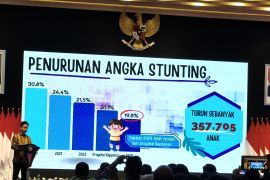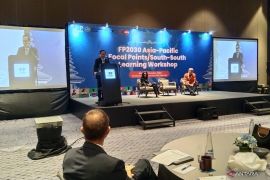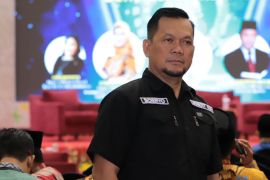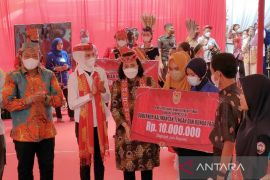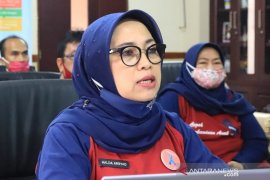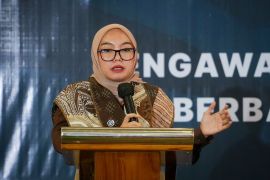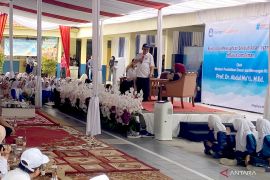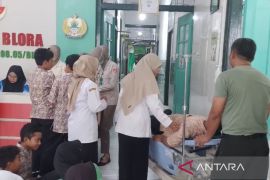The persistence of such cases highlights the urgent need for broader public education and grassroots-level facilitation to better protect women and children.
To address this challenge, the United Nations Population Fund (UNFPA) has launched the Adolescent and Adult Facilitator Training under its Indonesian Women Living Without Violence (PIHAK) program.
The initiative aims to improve and sustain access to quality services for survivors of gender-based violence.
Tackling cases on the ground
Lindayani, a community facilitator from Lenek Duren Village in East Lombok, West Nusa Tenggara, is among those trained through the program. She has worked on several child marriage cases, including one involving a ninth-grade girl and an eleventh-grade boy.
The girl reportedly experienced an unwanted pregnancy that ended in abortion. After a health emergency and subsequent recovery, her parents insisted on marriage.
Lindayani reported the case to local authorities and monitored the marriage dispensation process. She also advocated for the couple to delay pregnancy until the girl turned 19. Despite her efforts, East Lombok’s Women’s Empowerment, Child Protection, Population Control, and Family Planning Service (DP3AP2KB) rejected the dispensation request.
Eventually, both families proceeded with a religious marriage ceremony that was not officially registered with the state.
Local traditions and gender norms hinder progress
Ahmad Yani, another community facilitator, explained that East Lombok has long faced high rates of divorce, domestic violence, and gender-based discrimination. In many rural communities, women’s roles are still confined to domestic duties.
"The belief that a woman’s place is only in the kitchen still prevails. Men are still viewed as the sole decision-makers,” Ahmad said.
He also highlighted the traditional practice of merarik, in which a man elopes with a woman, pressuring both families to approve the marriage to avoid public shame.
Changing mindsets through local training
Ahmad and other facilitators continue to raise awareness about gender equality and the dangers of child marriage. The Pulih Foundation and Lembaga Pengembangan Sumber Daya Mitra (LPSDM), UNFPA’s implementing partners, have introduced the PIHAK program in Lenek Duren Village to support these efforts.
The PIHAK project is currently active in East Lombok, Brebes in Central Java, Garut in West Java, and Serang in Banten.
With the support of Adolescent and Adult Facilitator Training, facilitators and village heads in Lenek Duren are expected to be better equipped to handle child marriage cases.
In East Lombok, the training has been held three times since 2024, covering gender awareness, case facilitation, and problem-solving techniques in the context of women and child protection.
Legal and educational push
Ahmat, Head of the East Lombok Women's Empowerment, Child Protection, Population Control, and Family Planning Service (DP3AP2KB), reaffirmed the local government’s commitment to addressing child marriage.
He said that in 2021, the district head instructed all village leaders to draft regulations aimed at preventing such practices.
The region has also implemented East Lombok District Head Regulation No. 41 of 2020, alongside a provincial-level regulation designed to delay the age of marriage. Schools now conduct awareness programs to educate students about the risks associated with early marriage.
"We remind students to chase their dreams first and postpone marriage,” said Ahmat.
Schools are also required to incorporate lessons on the impacts of child marriage into their curricula.
Progress and remaining challenges
Between January and May 2025, 27 child marriage cases were officially recorded in East Lombok. The district documented 38 cases in 2024, down slightly from 40 in 2023. However, these figures likely underestimate the true extent of the problem, as many unregistered marriages go unreported.
Efforts to curb child marriage in East Lombok continue to face significant hurdles. Stronger collaboration is needed — not only from the government but also from civil society, the private sector, and the media.
Public education remains essential for raising awareness about the harms of child marriage. Beyond violating the law, it denies children their rights to education, health, safety, and freedom from violence.
Wider community engagement and awareness are key to reducing child marriage and ensuring a better future for the youth of East Lombok.
Related news: BRIN expert highlights rampant child marriage practices in villages
Related news: Government launches child marriage prevention guideline
Translator: Anita Permata Dewi, Resinta Sulistiyandari
Editor: Anton Santoso
Copyright © ANTARA 2025

